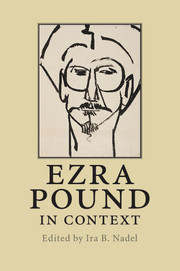Book contents
- Frontmatter
- Contents
- Notes on contributors
- Acknowledgements
- Chronology
- List of abbreviations and note on references to The Cantos
- Introduction
- Part I Biography and works
- Part II Historical and cultural context
- 16 The classics
- 17 Provençal and the troubadours
- 18 Dante and early Italian poetry
- 19 America
- 20 Venice
- 21 London
- 22 Paris
- 23 Rapallo and Rome
- 24 Pisa
- 25 Imagism
- 26 Vorticism
- 27 Music
- 28 Visual arts
- 29 Confucius
- 30 The Orient
- 31 Little magazines
- 32 Publishing and publishers
- 33 Modernism
- 34 Fascism
- 35 Anti-Semitism
- 36 Gender and sexuality
- 37 Race
- 38 Travel
- Part III Critical reception
- Further reading
- Index
33 - Modernism
Published online by Cambridge University Press: 05 July 2014
- Frontmatter
- Contents
- Notes on contributors
- Acknowledgements
- Chronology
- List of abbreviations and note on references to The Cantos
- Introduction
- Part I Biography and works
- Part II Historical and cultural context
- 16 The classics
- 17 Provençal and the troubadours
- 18 Dante and early Italian poetry
- 19 America
- 20 Venice
- 21 London
- 22 Paris
- 23 Rapallo and Rome
- 24 Pisa
- 25 Imagism
- 26 Vorticism
- 27 Music
- 28 Visual arts
- 29 Confucius
- 30 The Orient
- 31 Little magazines
- 32 Publishing and publishers
- 33 Modernism
- 34 Fascism
- 35 Anti-Semitism
- 36 Gender and sexuality
- 37 Race
- 38 Travel
- Part III Critical reception
- Further reading
- Index
Summary
When he looked back over the modernist experiment in the early 1950s for his introduction to a collection of Ezra Pound's criticism, T. S. Eliot did not doubt the role of his longtime friend and sometime antagonist in helping to create an entire movement. “Mr. Pound is more responsible for the xxth Century revolution in poetry than is any other individual,” he wrote (LE, xi). Eliot hastened to add that not merely Pound's own work but his role as “a teacher and a campaigner” marked his contribution. He noted Pound's insistence on conveying his own discoveries to others and described his passion for communicating them as akin to that of someone trying to convey to a deaf man the fact that the house is on fire. Most of all, Eliot praised Pound because “he has cared less for his personal achievement than for the life of letters and art” and that his career yielded “the lesson to care unselfishly for the art one serves” (LE, xii). Pound's promotion of literary art involved promotion of the men and women who wrote it as well. Among others, he advanced the careers of Hilda Doolittle (H.D.), William Carlos Williams, Marianne Moore, Eliot himself, Richard Aldington, Robert Frost, Wyndham Lewis, James Joyce, and Ernest Hemingway.
Pound's primary contributions lay in literary technique, though he produced plenty of ideas as well and grew increasingly strident about them. He conceived of modernism originally in terms of reaction against nineteenth-century poetry, especially late Victorians like Tennyson, Arnold, and the derivative poets of the turn of the century like the Georgians. He had a lifelong sympathy for Browning's experimentalism in diction, cadence, and structure though, and generally though not always distinguished his weaker contemporaries and immediate predecessors from their stronger Romantic models like Keats. In his “Credo” of 1917 he expected modern poetry “to move against poppycock…to be harder and saner…it will not try to seem forcible by rhetorical din and luxurious riot…fewer painted adjectives…austere, direct, free from emotional slither” (LE, 12). For Pound that meant stripping away unnecessary or florid diction, finding new rhythms to express the new formulations, and searching for new ways of structuring verse.
- Type
- Chapter
- Information
- Ezra Pound in Context , pp. 366 - 375Publisher: Cambridge University PressPrint publication year: 2010

